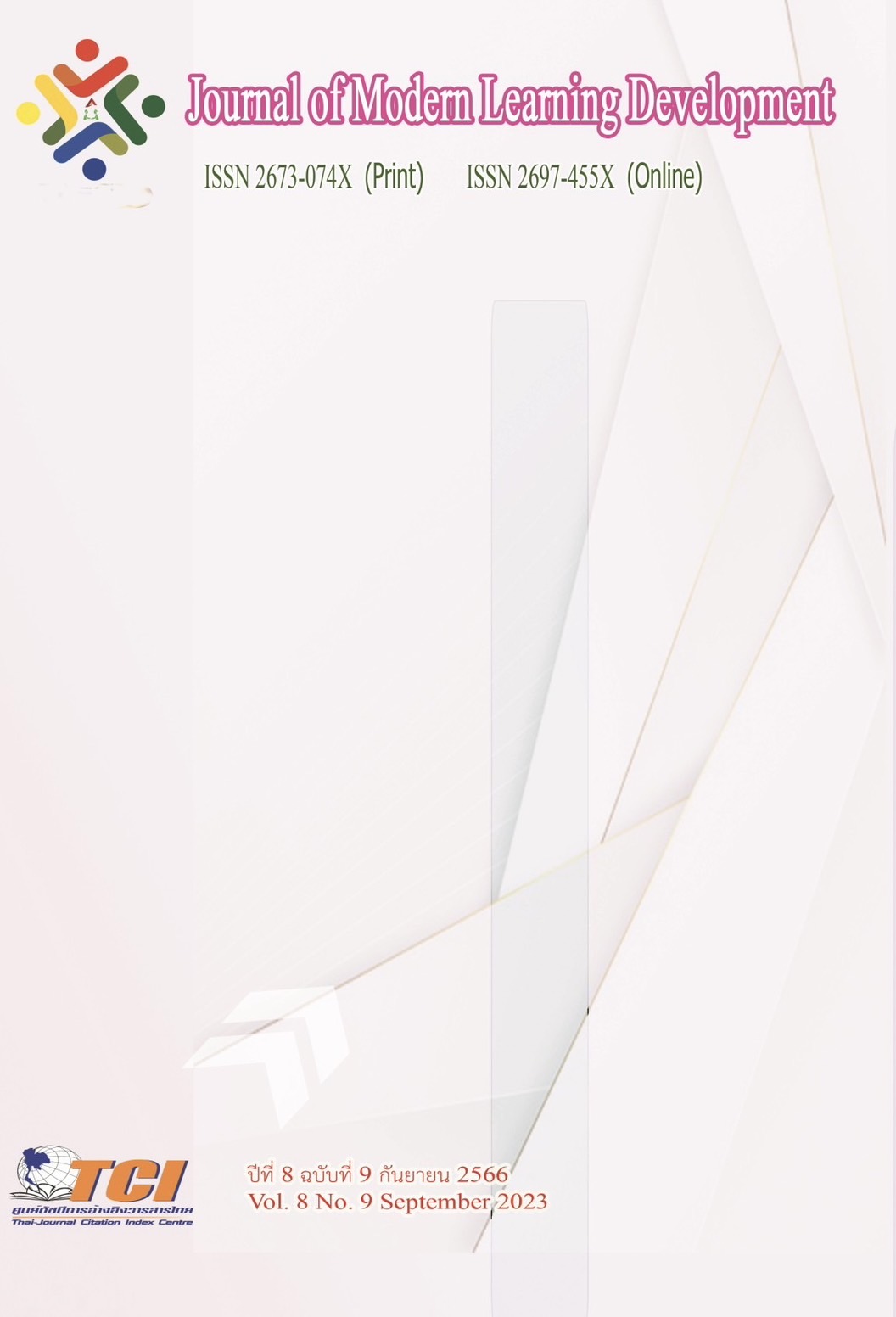The Learning Organization Development of Temple and Community in Phetchabun Province
Main Article Content
Abstract
This research has 3 objectives which are 1) to study the concept of temples and communities as a learning source. 2) to study the development of a learning organization of temples and communities in Phetchabun Province. 3) To propose a model for the development of learning organizations of temples and communities in Phetchabun Province. By using Mixed Methods Research, divided into 2 phases: Phase 1 the quantitative research which the sample consisted of monks, academics and people total 500, and Phase 2 the qualitative Research by interviewing 4 groups with a total of 48 people. The research instrument was a questionnaire and interview forms. The statistics used for data analysis were frequency, percentage, mean, standard deviation, multiple regression analysis and content analysis. The results of the study showed that the concept of temples and communities as a source of learning, especially the art-cultural of Buddhism will be affected by social changes, economic and very politically, causing people to look at religion in various terms either optimistic or positive and even pessimistic or negative. But Buddhism still has a lot of artistic and cultural influence in the minds of Thai people and displayed in the form of archaeological sites, antiques, traditions, habits, arts-culture or compassion and generosity. These things may be called characteristics that exist in Thai society; which is a characteristic of Buddhism, therefore, it is considered that Thai society is a Buddhist society. The person who has played an important role in pushing Thai society to be a Buddhist society from the past to the present is monks. Therefore, the Sangha Institute is a very important institute tradition. Monks from the past to the present play an important role in the way of life of most Thai Buddhists both in morality and worldly activities. The monks are one of the three rattas, namely the Buddha, Dharma and the monks as the representative of the Lord Buddha; is an indispensable Buddhist institution. In the daily lives of Buddhists. Aside from being a reliance on the mind moral guidance by pointing it out and showing it and is an institution that provides religious services and ordinances. Monks also promote, preserve, preserve arts-cultural and provide other services that the government mechanism does not provide in all services; it also helps to strengthen the mechanisms of the government to achieve its goals and also help the society in various ways.
2. The state of development is a learning organization of temples and communities in Phetchabun province due to the impact of economic and social development under globalization. Which is both diverse and quick to receive information, causing an imbalance in the development of a learning organization of temples and communities in Phetchabun Province; The problems are 6 aspects : 1) Environment. 2) Buddhism ordinances / rituals. 3) Art-cultural promotion media. 4) Art-cultural learning source. 5) Academic activities for art and culture promotion. 6) Art-cultural network. Resulting in many different social problems.
3. Model for the development of learning organizations of temples and communities in Phetchabun province. In order to carry out the arts and culture promotion work to achieve the objectives of the development, promotion and promotion of arts-cultures in 6 areas which are; 1) Environment. 2) Buddhism ordinances / rituals. 3) Art-cultural promotion media. 4) Art-cultural learning source. 5) Academic activities for art-culture promotion. 6) Art-cultural network. Buddhism Is an important foundation of Thai art-culture because Thai people have been respecting Buddhism for a long time. And Buddhist principles in Buddhism Molded and absorbed in the Thai way became the foundation of Thai people's way of life in every aspect Including ways of life, languages, customs and traditions and morals; considered as a guideline for conduct for good behavior to behave in a way that creates good prosperity and mental stability, for the benefit of oneself and society , if people in the society deteriorate, believe in the principles of Buddhism; Buddhism will make it part of the promotion of art-culture.
Article Details
References
กองแผนงาน กรมการศาสนา. (2542). ปัจจัยส่งผลต่อความสาเร็จของเจ้าอาวาสในการพัฒนาวัดให้เป็นศูนย์กลางของชุมชน. กรุงเทพมหานคร: กรมการศาสนา,
คณะกรรมการสิ่งแวดล้อมแห่งชาติ. (2530). การพัฒนาการอนุรักษ์สิ่งแวดล้อมศิลปกรรม. กรุงเทพมหานคร: โรงพิมพ์การศาสนา,
จริน ศิริ. (2549). “การพัฒนาศักยภาพชุมชนด้านการท่องเที่ยวโดยใช้วัฒนธรรมชุมชนเป็นฐานในการพัฒนา : กรณีชุมชนเมืองกื้ด อำเภอแม่แตง จังหวัดเชียงใหม่”. วิทยานิพนธ์ปริญญาศิลปศาสตรดุษฎีบัณฑิต สาขาวิชาการวางแผนพัฒนาชนบท. บัณฑิตวิทยาลัย: มหาวิทยาลัยแม่โจ้,
จุมพล พูลภัทรชีวิน และคณะ. (2549). การวิจัยและพัฒนากระบวนการสร้างความดีมีคุณธรรม. ศูนย์ส่งเสริมและพัฒนาพลังแผ่นดินเชิงคุณธรรมสำนักงานบริหารและพัฒนาองค์ความรู้ (องค์การมหาชน),
นิสา พิมพิเศษ, (2554). “แนวทางการจัดการโบราณสถานในจังหวัดอุตรดิตถ์”, วิทยานิพนธ์ปรัชญาดุษฎี
บัณฑิตสาขาวิชาการจัดการทรัพยากรวัฒนธรรม, บัณฑิตวิทยาลัย: มหาวิทยาลัยศิลปากร,
ทรงฤทธิ์ เหมือนพรม. (2554). “งานสร้างสรรค์ศิลปะไทย/สื่อผสมในงานพุทธศิลป์”. วิทยานิพนธ์ปรัชญาดุษฎีบัณฑิต สาขาทัศนศิลป์. บัณฑิตวิทยาลัย: มหาวิทยาลัยศิลปากร,
ธานินทร์ ศิลป์จารุ. (2552). การวิจัยและวิเคราะห์ข้อมูลทางสถิติด้วย SPSS. พิมพ์ครั้งที่ 10. กรุงเทพมหานคร: บิสซิเนสอาร์แอนด์ดี,
พระพุทธโฆษาจารย์ (ประยุทธ์ ปยุตฺโต). (2532). ความสำคัญของพระพุทธศาสนาในฐานะศาสนาประจำชาติ. กรุงเทพมหานคร: มูลนิธิพุทธรรม,
สำนักงานคณะกรรมการวัฒนธรรมแห่งชาติ. (2537). แผนแม่บทโครงการสืบสานวัฒนธรรมไทย พ.ศ. 2538 – 2540. พิมพ์ครั้งที่ 3. กรุงเทพมหานคร: โรงพิมพ์นีลนาราการพิมพ์,
สำนักงานคณะกรรมการการศึกษาแห่งชาติ. (2545). รายงานการประชุมทางวิชาการเรื่องทิศทางวัฒนธรรม กับการศึกษาในกระแสแห่งการเปลี่ยนแปลง : สกศ. กรุงเทพมหานคร: ห้างหุ้นส่วนจำกัด วี.ที.ซี. คอมมิวนิเคชั่น,


